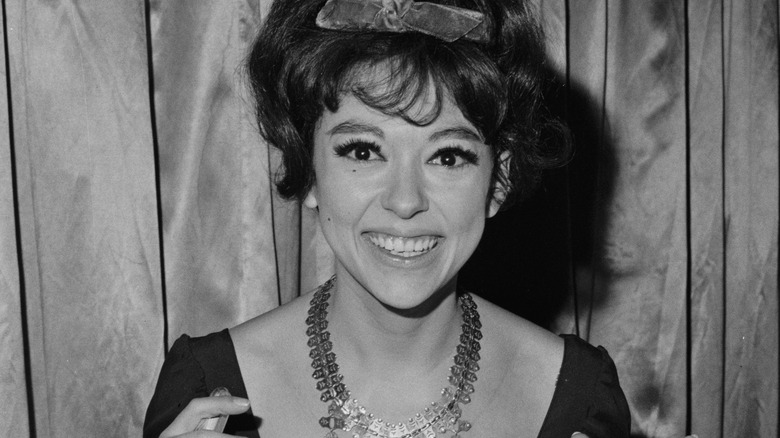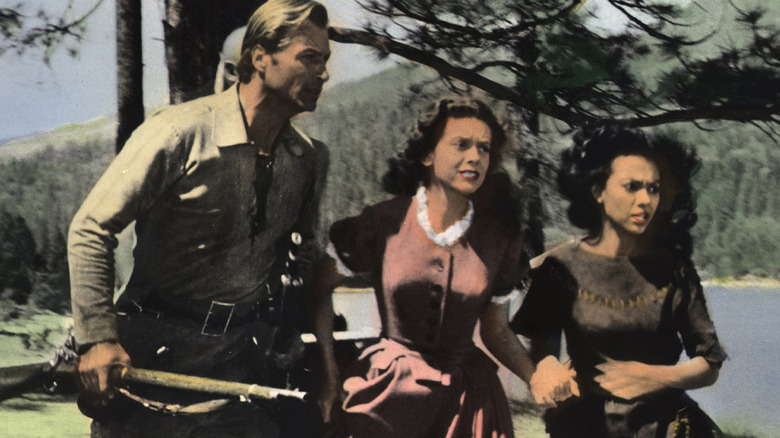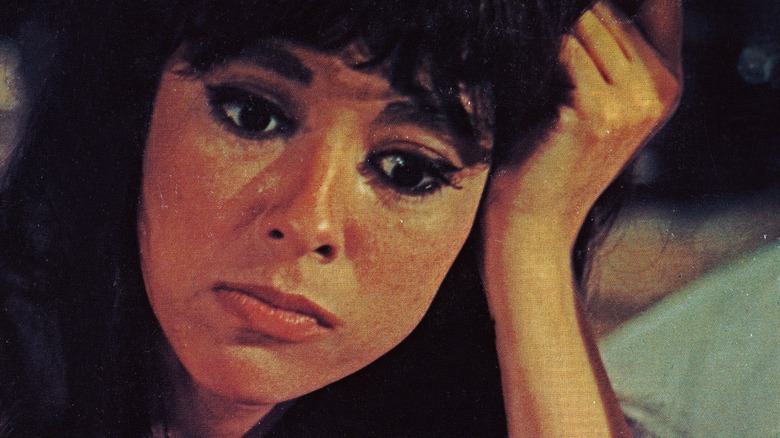Why Rita Moreno Refused To Make Movies For 7 Years After Winning Her Oscar
Rita Moreno almost didn't attend the 1962 Academy Awards. At the time the nominees were announced, she was busy filming "Cry of Battle," in which she played the female lead, and filming was being done in the Philippines. Taking off for Hollywood could mean a delay in production. Moreno was also sure she had no chance of winning. Judy Garland's performance in "Judgment at Nuremberg" was lauded, even by Moreno herself, and Moreno expected Garland to take the Oscar.
A win at the Golden Globes convinced Moreno that there was at least a slim possibility that she could take the award, so she arranged to fly back to Los Angeles for the ceremony. But she still didn't think much of her chances. Where other stars might have practiced an acceptance speech, she practiced how to lose. Techniques rehearsed included appropriate facial expressions, denouncing the film she was nominated for — "West Side Story" — and denying that she even wanted the Oscar. The latter two pretenses were false; Moreno had enthusiastically embraced the part of Anita in "West Side Story," despite running into issues of racism, and despite not rating her chances, she desperately wanted to win.
Still, Moreno didn't have any speech prepared when she went into the theater for the ceremony. So when her name was called, she was taken completely off-guard. delivering one of the shortest acceptance speeches ever given at the Academy Awards. It was a triumph, but it wasn't a game-changer for Moreno's career. The ethnic barriers that had plagued her coming up through Hollywood, and affected her Oscar-winning part, endured — which helped convince Moreno to take a long break from movies.
Rita Moreno dealt with stereotyping and racism before winning the Oscar
Rita Moreno, born Rosa Dolores Alverio, broke into Hollywood at 17. As she recalled for NPR, she and her mother paid a visit to MGM founder Louis B. Mayer himself at the Waldorf-Astoria, where he said of Moreno, "Wow! She looks like a Spanish Elizabeth Taylor!" It wasn't a coincidence that he thought of Taylor; Moreno idolized the star and patterned her looks that day after her idol. Mayer's MGM debuted her in "The Toast of New Orleans" in 1950 (her first appearance in any film was in "So Young So Bad" earlier the same year).
Unfortunately, being the Spanish Elizabeth Taylor— the Spanish anything — in the Hollywood of that era meant typecasting. "I became the house ethnic," Moreno told NPR, explaining that she was routinely cast as not only Hispanic and Latina characters, but any part that wasn't explicitly white and American. "I call that my dusky maiden period," she told Variety, adding that she had to affect a generic "ethnic" accent despite her perfect English to cover all casting bases.
"West Side Story" represented a breakthrough for Moreno. Despite being arguably in the vein of the "Latin spitfire" roles she'd often been put in before, Anita offered greater strength and range. "[She] became my role model after all those years," Moreno said of the part. But even with "West Side Story," Moreno dealt with prejudice. She insisted on the lyrics to the song "America" being changed for their offensive nature. And when she complained that her make-up made her look too dark, she was accused of racism herself.
Moreno didn't work after the Oscar because she wasn't offered anything worthwhile
Caught by surprise by her Oscar win, Rita Moreno did quickly improvise two rules for herself as she went up to receive the statuette. As she recalled for The New York Times, they were, "[The first was] don't run; it's not dignified ... [and] do not thank anyone. They didn't give you the part as a favor. They were forced to give it to you because you did the best screen test." True to her own code, she thanked no one and hurried off the stage. She didn't stick around for all the accolades that come from winning an Oscar either; she had a film set to get back to. She was told of all the celebrations on her behalf, particularly within the Latin community, by friends.
But accolades weren't followed by offers, at least not the kind Moreno wanted. Contrary to her expectations, she only put up for the same kind of generic ethnic roles she'd been playing for years. "West Side Story" was even a liability at times; her agent told Moreno that because she was Anita, one producer refused to consider her for a part with "no nationality."
"All the Latina roles in films were so perfunctory," she told the Times years later. "And I said, 'I'm not going to do that stuff anymore with the accents.'" Because she wouldn't take disappointing parts, she didn't work in Hollywood for seven years. All her acting work during that time was on the stage. But the movie dry spell ended with "The Night of the Following Day" in 1968.


